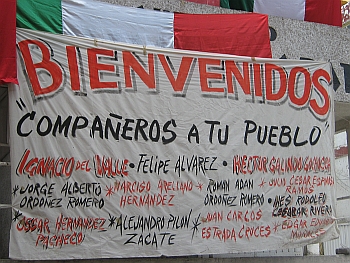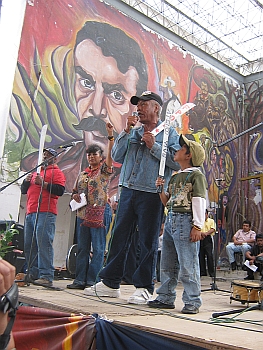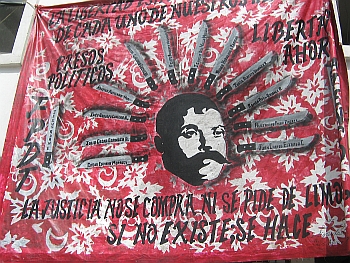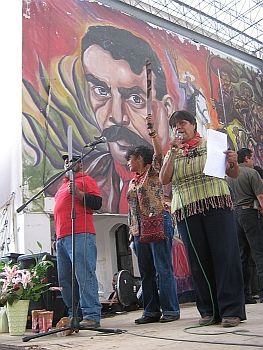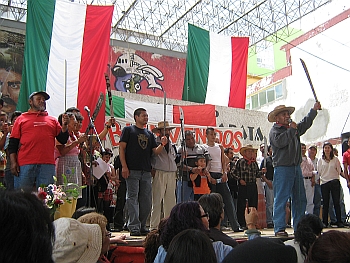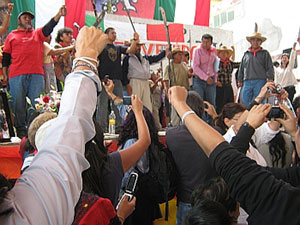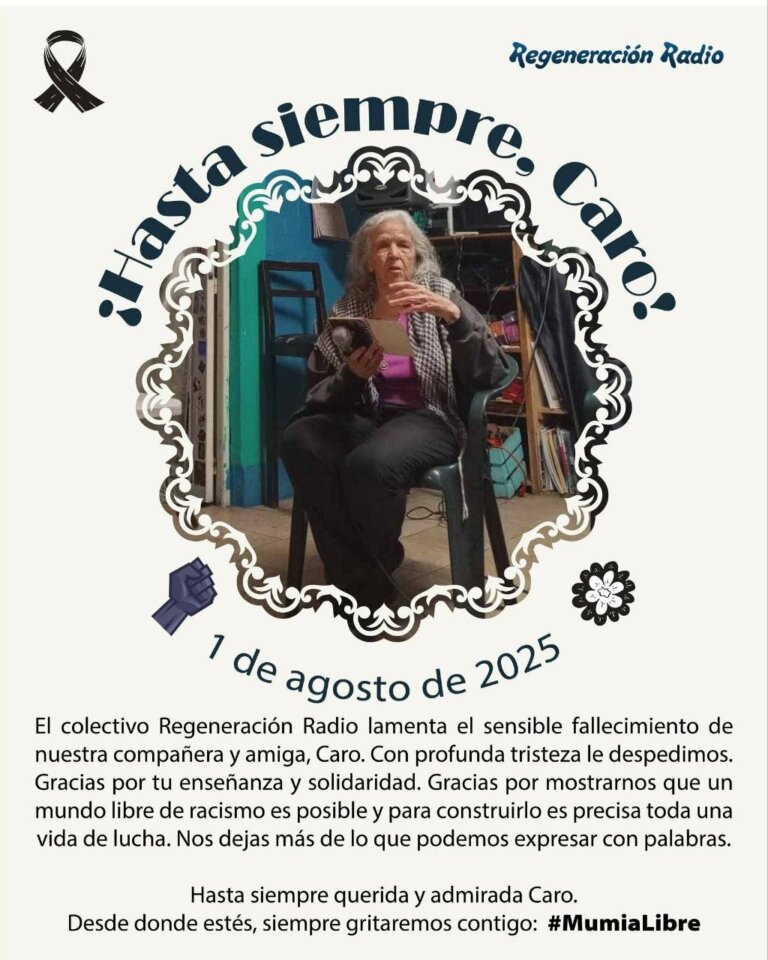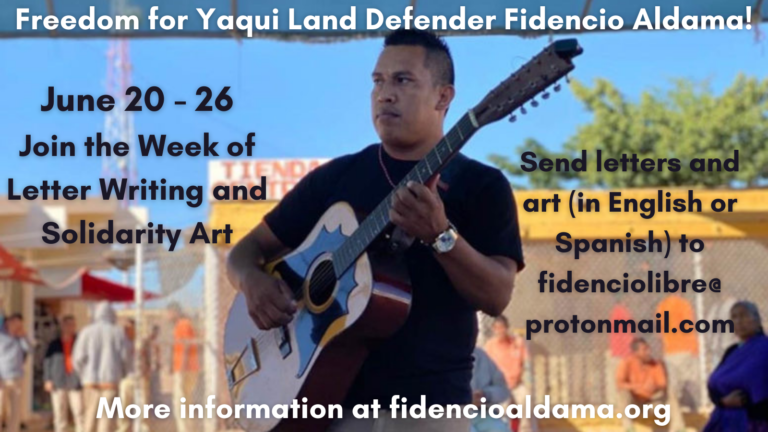x carolina
––When did you find out you were getting out of prison, don Ignacio?
––We’ve always known we’d get out, from the very first moment.
––Was that due to your trust in the people to free you?
––It had more to do with our rage. A rage we’ve stored up inside us. Maybe at first we felt fear. Anguish, along with troubles, uncertainty, rage, impotence. All that transcends pain. It overcomes suffering. We were never sorry, never repentant. This kind of anger knows no human limits. It builds up inside you and, in a way, helps you avoid physical pain… The rage I’m talking about is recent and has also been with us during years, during centuries, of latent suffering… On the question of whether or not we were going to get out, we knew we would because the struggle was not going to let up. It may have fallen back a little bit out of fear, anxiety. But even though we were separated, with people on the run or in jail, we all thought the same way. We had one thing in mind to begin with. Not to give up. Because our pain was overcome by our rage, our unrest, and the confirmation of what we, as people from the bottom of the heap, have always known.”
So begins the interview with Ignacio del Valle by some of us from the free and independent media on Sunday, July 4, in San Salvador Atenco, during the celebration of the liberation of 12 prisoners that the Mexican State planned to torture to death in its extermination camps, with infamous sentences of 112 years, 67 years, 32 years. There’s music, lots of music. Dancing, lots of dancing. Food, lots of food. Pulque, lots of pulque. Smiles, lots of smiles. Hugs, lots of hugs. Thanks, lots of thanks to everybody who played a part in the victory ––to the women of Atenco who’ve offered us coffee, breakfast, lunch, and supper at every march, rally and event held during the last four years; to Atenco’s old guard, especially to don Francisco Alarcón, who speaks nahuatl and blasts off the old cannon at all the parties and rallies; to the Committee for Freedom and Justice for Atenco; to the social and human rights organizations; to international solidarity.
––Don Ignacio, we’ve had very few triumphs in our movements, but two of these have taken place right here in Atenco. How was this possible?
––People understood perfectly, and this was very clear in everyone’s mind this second time around, that we would not give up or give in. We had been through the same kind of repression before, nine years ago. It was clear that if we stood our ground, we would win. It’s true, of course, that a lot of people fell back, protecting their families, but even so, they were steadfast and participated in many ways.
“América del Valle, we want you in the streets!” This chant rings out over and over during the celebration. It’s a top priority now. América del Valle, whose request for political asylum in Venezuela put the international spotlight on all the injustices in the Atenco case at a critical moment, is still pursued by the State.
Trinidad Ramírez expresses thanks to everyone with her characteristic grace and generosity: “The triumph is yours.” She reads a statement prepared by the Peoples’ Front in Defense of the Lands (FPDT), which affirms that the struggle continues with autonomous projects for defending the land and with actions in solidarity with other groups in struggle, including the electrical workers of SME, miners, political prisoners, Zapatista indigenous peoples in Chiapas, the autonomous municipality of San Juan Copala, and all the organizations fighting against the plunder of their lands. The statement says: “…To the cry of ‘The land is not for sale; we love it, we’ll defend it!”, our struggle in these lands began in 2001 when Vicente Fox wanted to build his airport. It wasn’t a simple matter to defeat the project because first we had to overcome the idea that there was no use struggling against the government because nobody can win; even so, we did it. We won. We in the FPDT know that history is not fatalistic; it’s something we build. And if we won once, we might be able to do it again… There’ s somebody who’s still not here. América del Valle. We’re going to bring her home. We’ll keep right on struggling until she’s back here with us…”
In the interview, Ignacio del Valle stated: “We’re sure she’ll be able to come back, and not because we think someone will let her do it out of goodwill. No. We’re not asking for an act of goodwill. We´re saying: Do what you’re supposed to do NOW. Why? Because the people demand it. And, in one way or another, the struggle continues. And America herself is resisting and will keep on resisting. But it’s not a passive resistance. It’s an active resistance. Because wherever she is, maybe she’s saying, in her silence, that the struggle must continue. It goes without saying that we don’t have to ask the government for any favors. Freedom is not the consequence of a favor or of an act of goodwill. It’s an obligation, and it’s imperative that the system set her free”.
Another pursued person is back in town and is present at the victory party. Adán Espinoza still faces a minor charge, but is joining in the struggle once more. He insists on the importance of getting organized and of everyone coming together in unity in order to move forward.
Several of the prisoners just released from Molino de Flores are also present at the celebration, including Inés Rodolfo Cuellar, who tells us that, when some of the regular prisoners found out about the release order, they said: “The ‘Atencos’ are leaving. Who’s going to stand up for us now?” And when they walked out the gate, the regular prisoners were there shouting, “ Zapata lives! The struggle continues!” With the release of these prisoners, the Other Encampment outside the Molino de Flores prison was finally lifted, putting an end to a four-year-long act of solidarity by successive groups of comrades from the Other Campaign.
Felipe Álvarez climbed up on the stage and talked about what it takes to get through imprisonment: “Compañeros, I ask this of you. Day in and day out, do what you must to become more conscious, because it’s only with consciousness that we can go ahead, it’s only with consciousness that we can withstand repression, it’s only with consciousness that it’s possible to get through imprisonment. There are all kinds of bastards ––police and guards–– there inside who are always repressing you psychologically and physically. And if you don’t have consciousness, compañeros, you won’t be able to get through what goes on where we were. People that can’t stand it, hang themselves. A lot of Mexican people don’t know about this. They don’t know that in La Palma, in Altiplano, there are people who hang themselves. Sometimes the treatment is so bad when they come into the prison that when they’re taken to the holding cells, they die within just a few minutes. Then the damn cops run around saying, “You went too far this time, dude. That guy is done for.” And people don’t know about the deaths in La Palma because all that doesn’t exist. Human rights don’t exist in La Palma. What exists in La Palma is extermination. Day by day they try to finish you off psychologically and physically, compañeros. I’d like to mention a few specifics about the treatment you get in La Palma. They give you five minutes to eat, compañero. They give you five minutes to shower, compañero. Sometimes with boiling water. If you object and ask why, they say, “You’re an animal, you dumb ass. You’re a criminal. So you just have to take it like an animal and scald yourself with hot water.” I was bedridden, compañeros, two times for fifteen days each time, with serum and with one foot tied to the bedpost. They chained me with a padlock and chain. That’s the way I ate. That’s the way I slept. I’m not telling you this to scare you because then you won’t be back to participate. I’m telling you this so you’ll become more conscious and so we all know what we’re getting into.”
“No forgiving. No forgetting. The killers must be punished!” Impunity still reigns in the Atenco case and demands for justice are heard all day.
––Don Ignacio, what kinds of actions do you think we should take against the prisons. Demand better conditions? Tear the prisons down? Stop prison construction?
––Certainly. Prison construction, as a project, only deals with effects, not causes. The causes are elsewhere. It’s true there’s a crime wave, and most of the people jailed are young men and boys between 18 and 25 years old….But in the communities there are no opportunities for work, study, or job training. So how are they going to cover their most basic proletarian needs for food and a job? I would ask, what difference would it make if five schools were built for every prison? But we’re not concerned with quantity. We want quality education. These issues can’t be seen as separate from an equal distribution of the wealth. If there’s no equal distribution, or at least equitable or fair distribution in keeping with the real needs arising in each community, whether that be a region, a state, or a country, there will certainly be no justice. And the system is not going to resolve this situation. The people on the bottom have to resolve it by initiating a national project. From the bottom up. The people on top will only manipulate it. The problem is not that they’re building more prisons. The problem is that in comparison with education, there’s a huge abyss. And the solution is not building more schools either. It lies in a total change of the system. And to achieve this, we have to get organized. The form this will take will depend on the reality of each region, each season, each place. Right now in our region, Mexico, the dependence we’re experiencing is very similar to that of other regions. We’re facing a huge monster. It’s the international economy. We’re living in a country with a tremendous amount of poverty and, above all, widespread social decomposition, in which the wealth is in very few hands and the vast majority of people are poor. The problem is not to attack poverty. We have to attack wealth. We have to change everything.
––Don Ignacio, what can be said to the Mexican people in general who aren’t organized but who are feeling the effects of the blows dealt by the capitalist system?
–– I don’t think we have to give the first lesson. That lesson has already been given to us by the movements in resistance. We don’t have to repeat the course. We have to be taking the next steps forward, but beforehand, and I want to make this perfectly clear because it’s key, we shouldn’t confuse a small-scale organization with a people or confuse an organization representing the interests of a particular group with a community. Above and beyond being an organization, regardless of its colors, or whether it’s in the center or on the edge or in between, the aim of any organization, above and beyond that of a particular group, is to be a people. And when we understand this situation, we’ll be able to respect each group’s desire to participate in a particular way in times of peace, but in times of war, we have to unite as a people, because before being an organization, whatever its title may be, we’re a people. And that is the most beautiful banner we can take up.
––What is the role of indigenous and original peoples in this process?
––They’re basic. As long as we’re not proposing a change that comes from our roots ––in this case we are indigenous peoples, even though we’re wearing makeup and are penetrated by a foreign culture, but we’re the children and grandchildren of indigenous people; we can’t say that in the next generation we won’t be indigenous people anymore–– the system is the only beneficiary of this loss of identity…”
From the stage, with a sense of humor and reprimands aimed at common pretexts for doing nothing, don Nacho insists that everyone must participate and unite, but for real: “Compañeros, we must stand together. Our skin might get wrinkled, but not our consciousness. Brothers and sisters of my soul, thank you. Thank you for your solidarity…We have to unite. The only damn problem is these positions where we always think we’re right. It’s true, many people are right. They know how to tell if somebody’s doing something well, but if they don’t show up, what the fuck. Things stay the same…. Maybe other people don’t know how to do all this, but they do show up. They may be doing it all wrong, but they’re with you… We’re going to stand by our brothers and sisters at the mines. We’ll make statements, but we’ll also take action. We’re going to join with them, for real. Some say, “We were with you, Nacho. We were at your festival.” Thank you so much. And why in the fuck do I want you at my festival? I want you to be here when the shit comes down….No compas, let’s start joining together.”
Felipe Álvarez leaves us with these words:
“You don’t know how proud and happy it makes me feel to come out and find that you’re still here, to find that you weren’t afraid to end up where we did. That means that the consciousness I was talking about does exist. And that nourishes us, compañeros, and makes us stronger. And we’re going to Chiapas. We’re going anywhere we must, to stand up for our brothers and sisters and show our solidarity with them. Atenco will be there. Let the government take note. Let the damn system take note. Atenco will be there. We need many sons and daughters of Atenco, many sons and daughters of Chiapas, many sons and daughters of Guerrero. We must be everywhere, right? Together, we’re going to make the change that we want to make ––all of us who have been fucked over, all of us who have been repressed. We’re going to make the change. We’re going to run this damn system out of the halls of government. Not with votes, not playing at elections just to get a bone to suck on like those guys over there. We’re not going down that road. Our road is different, isn’t it? Even though there’s lots of mud and shit all around us, we’re not going to get dirty. Because when we’re conscious, we won’t be stained by all that dirt, compañeros. Even though we walk right over it, we won’t get dirty. So I want to thank you again and apologize because they’re waiting for me inside, but I’m back compañeros. I’m here with you again, ok? Thank you. I love you. I love you, brothers and sisters. You’re in my heart. Atenco lives! The struggle goes on! Zapata lives on! The struggle goes on and on! YES? NO? WHAT THE FUCK DO YOU MEAN, NO!”
